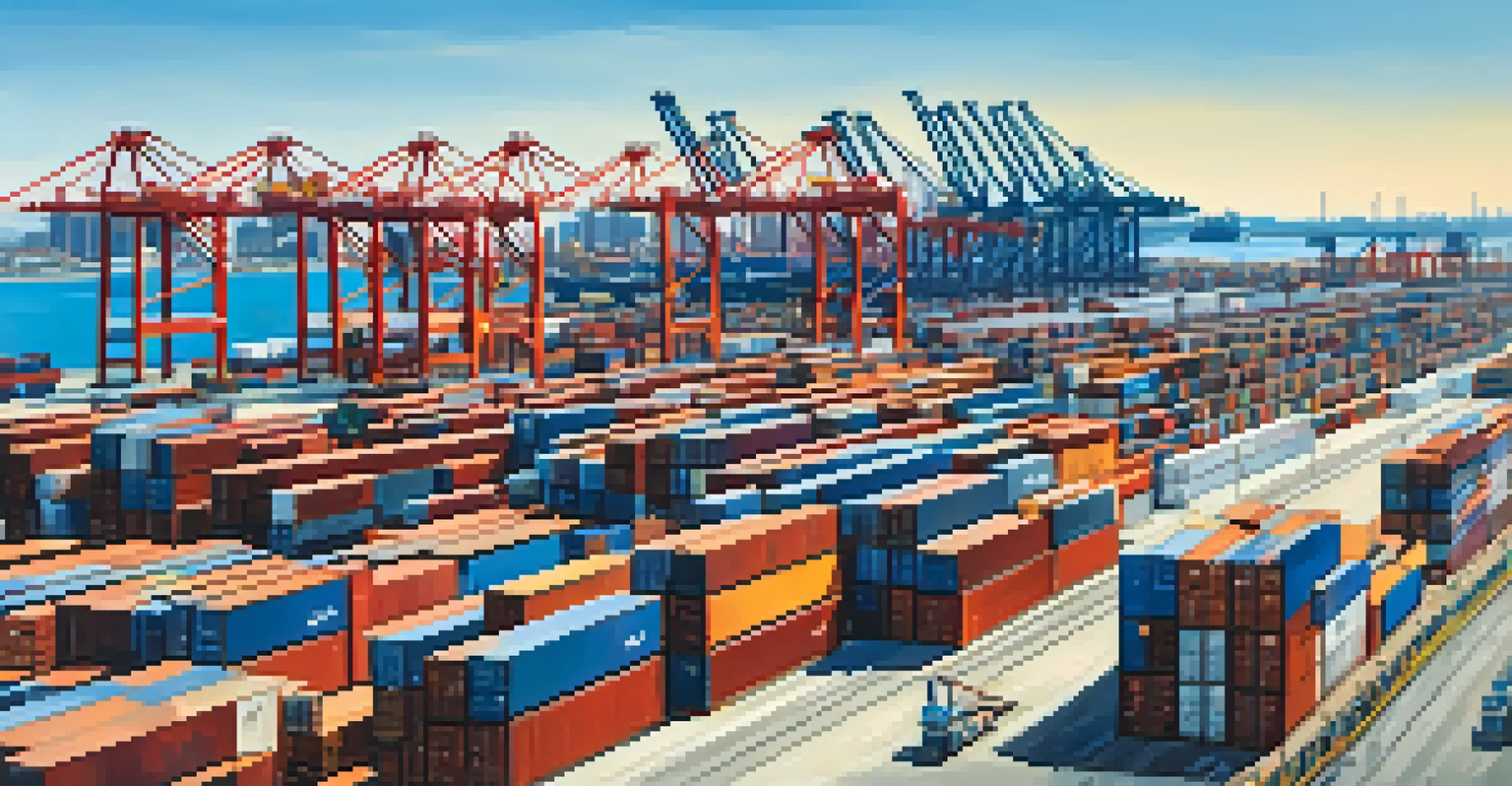The Evolution of Jacksonville's Economy Over the Years

Early Economic Foundations of Jacksonville
Jacksonville's economy began taking shape in the early 19th century, primarily driven by agriculture and trade. The city's strategic location as a port made it an ideal spot for shipping goods, especially timber and cotton. The establishment of railroads in the late 1800s further boosted economic prospects, connecting Jacksonville to broader markets.
The best way to predict the future is to create it.
As the population grew, so did the demand for goods and services, leading to the rise of small businesses and a vibrant local economy. This early economic landscape set the stage for future developments, as industries began to diversify. The foundation laid during these years was crucial for Jacksonville's growth into a bustling urban center.
By the end of the 19th century, Jacksonville was not just a trading hub but also an emerging tourist destination, attracting visitors with its warm climate and beautiful landscapes. This dual focus on trade and tourism would prove essential as the city navigated economic changes in the subsequent decades.
The Impact of World War II on Jacksonville's Economy
World War II marked a significant turning point for Jacksonville's economy, as military activities surged in the area. The establishment of several naval bases brought an influx of jobs, transforming the local economy almost overnight. This shift not only provided employment opportunities but also stimulated growth in related industries such as construction and manufacturing.

With the war's end, many veterans returned home, seeking stability and contributing to the local workforce. The post-war boom led to an expansion of residential areas and infrastructure development, which further fueled economic growth. This period saw Jacksonville evolving from a small city into a more significant urban center.
Jacksonville's Economic Evolution
Jacksonville's economy has transformed from an agriculture and trade hub in the 19th century to a diverse urban center influenced by military, finance, technology, and tourism.
The military's continued presence in Jacksonville has remained a vital component of the economy, influencing various sectors, including defense contracting and technology. This lasting impact underscores how external events can reshape local economies in profound ways.
The Rise of the Financial Sector in Jacksonville
As the 20th century progressed, Jacksonville began to establish itself as a financial hub in Florida. The city's favorable business climate attracted numerous banks and financial institutions, leading to a diversification of the economy. This shift was crucial, as it provided stability and resilience against economic downturns.
Economic growth is not just about numbers; it's about people and communities thriving together.
With the growth of the financial sector, other industries also flourished, including real estate and insurance. The influx of new businesses contributed to job creation and economic dynamism, making Jacksonville a more attractive place to live and work. The establishment of the Jacksonville Economic Development Commission in the 1970s further supported these efforts.
Today, Jacksonville is home to several Fortune 500 companies and a vibrant financial district, showcasing how targeted economic strategies can yield long-term benefits. The city's ability to adapt and innovate has positioned it as a key player in Florida's economy.
The Role of Transportation in Jacksonville's Growth
Transportation has always played a crucial role in Jacksonville's economic development, thanks to its unique geographic advantages. The city boasts one of the largest deep-water ports in the Southeast, facilitating international trade. This strategic asset has attracted numerous shipping and logistics companies, bolstering the local economy.
Additionally, the extensive highway network and proximity to major railroads have made Jacksonville a logistics hub. Businesses benefit from efficient transportation options, allowing for seamless movement of goods. This connectivity has been a magnet for both small businesses and large corporations seeking to capitalize on the city's logistical advantages.
Transportation Fuels Growth
The city's strategic location with a deep-water port and extensive transportation network has made it a logistics hub, attracting businesses and supporting economic development.
As e-commerce continues to grow, Jacksonville's transportation infrastructure is poised to support this demand. The evolution of the transportation sector reflects the city's adaptability and its commitment to fostering a robust economic environment.
Emergence of the Technology Sector in Jacksonville
In recent years, Jacksonville has experienced a surge in its technology sector, reflecting a national trend towards digital innovation. As companies increasingly rely on technology to streamline operations, the demand for tech talent has risen sharply. Local universities and training programs have responded by developing curricula aimed at equipping graduates with the necessary skills.
This focus on technology has attracted startups and established tech companies alike, creating a vibrant ecosystem for innovation. The rise of co-working spaces and incubators in Jacksonville has fostered collaboration among entrepreneurs, further fueling growth in this sector. This dynamic environment highlights the city's commitment to being at the forefront of technological advancement.
As Jacksonville continues to evolve, the technology sector's growth promises to play a vital role in shaping the city's economic future. With an emphasis on innovation, the potential for job creation and economic diversification is significant.
Tourism's Ongoing Influence on Jacksonville's Economy
Tourism has long been a cornerstone of Jacksonville's economy, with its beautiful beaches and cultural attractions drawing millions of visitors each year. The city's diverse offerings, from historical sites to outdoor activities, cater to a wide range of interests. This influx of tourists not only supports local businesses but also generates significant tax revenue for the city.
Events such as the Jacksonville Jazz Festival and the annual World of Nations Celebration further enhance the city's appeal, showcasing its rich cultural diversity. These events create jobs and stimulate economic activity, demonstrating the interconnectedness of tourism and local economies. The tourism sector's growth has led to increased investments in hospitality and entertainment.
Tourism Drives Local Economy
Tourism remains a vital component of Jacksonville's economy, generating significant revenue and supporting local businesses through its cultural events and attractions.
As Jacksonville continues to promote itself as a tourist destination, the economic benefits are likely to expand. This ongoing influence of tourism underscores the importance of maintaining a vibrant cultural scene and supporting local attractions.
Challenges and Opportunities in Jacksonville's Economy
Despite its many strengths, Jacksonville faces challenges that could impact its economic trajectory. Issues such as income inequality and access to education pose significant hurdles for many residents. Addressing these disparities is essential to ensuring that all citizens benefit from the city's economic growth.
However, there are also opportunities for Jacksonville to leverage its strengths. By investing in workforce development and fostering entrepreneurship, the city can create a more inclusive economy. Collaborations between public and private sectors can play a vital role in driving innovation and growth across various industries.

Ultimately, the future of Jacksonville's economy hinges on its ability to adapt to changing circumstances while remaining focused on inclusivity. By embracing both challenges and opportunities, Jacksonville can continue its evolution as a thriving economic powerhouse.